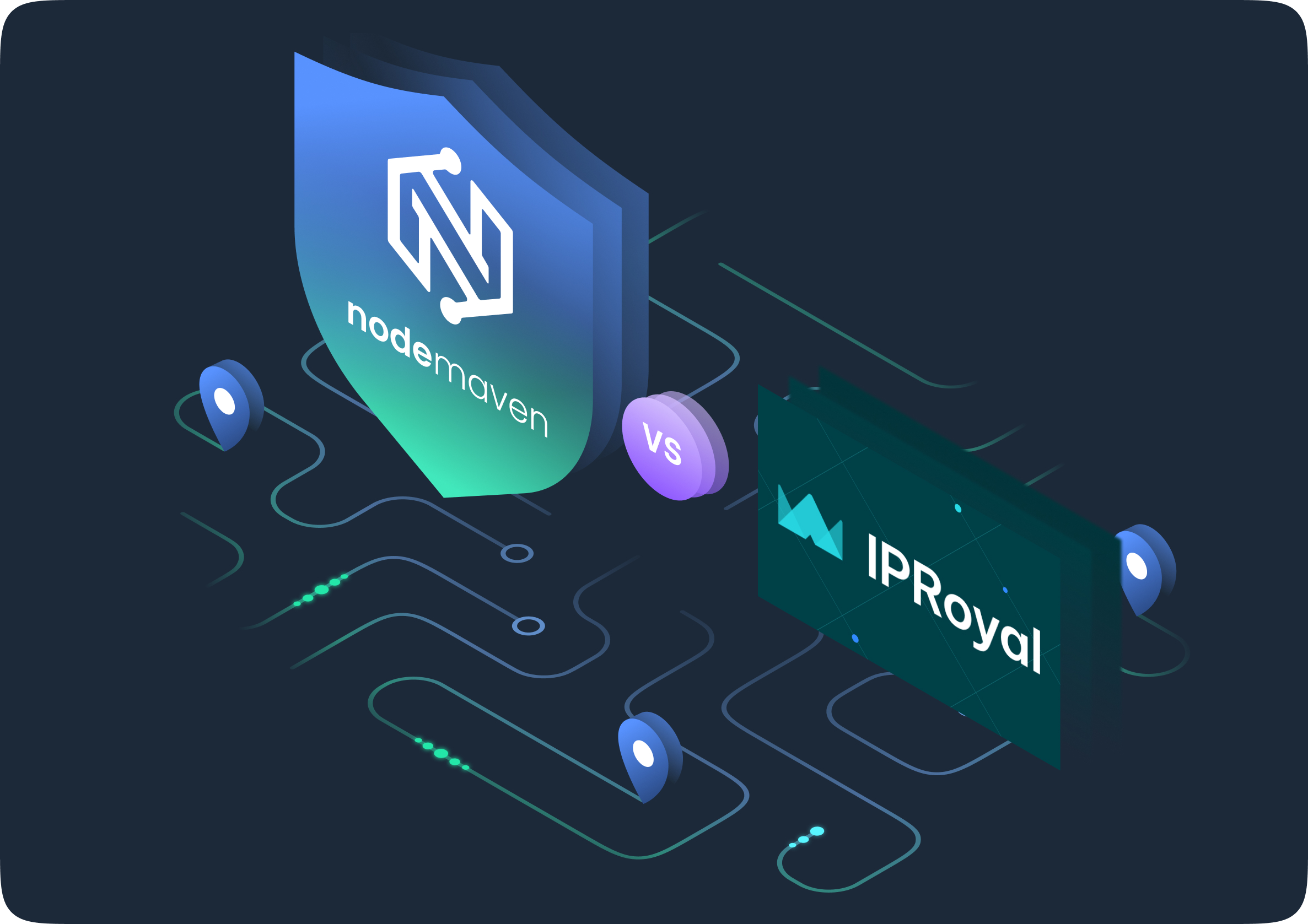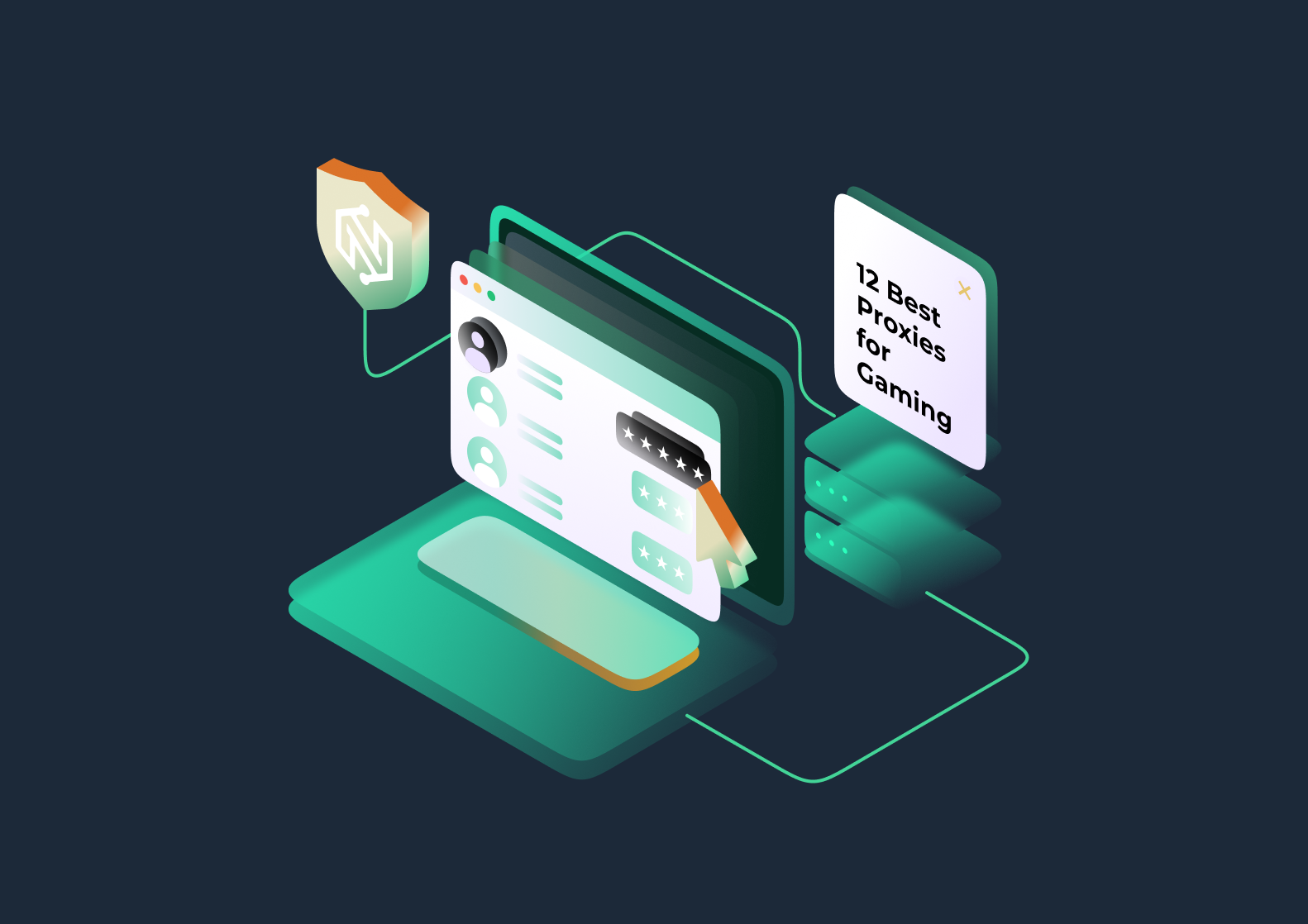What is a residential proxy is a question many businesses and everyday users still ask, even though these proxies have become a core part of modern online workflows. From market research and account management to localized testing and scraping, residential proxies help people work with fewer blocks and more accuracy.
This guide explains what residential proxies are, how they work behind the scenes, where they’re used, and what makes them different from other proxy types.
You’ll also find practical examples, setup tips, and a breakdown of how NodeMaven’s high-quality IPs improve reliability for a variety of everyday tasks.
What Are Residential Proxies?
A residential proxy is a proxy that uses a real IP address assigned by an Internet Service Provider (ISP) to an actual household device. Because these IPs belong to real home users, websites see them as genuine traffic and not flagged, automated, or suspicious.
Residential Proxies Meaning in Simple Terms
If a datacenter proxy looks like it’s coming from a server rack, a residential proxy looks like a normal person browsing from home.
This authenticity is what makes them harder to detect or block.
Why Residential Proxy Networks Are Trusted
A residential proxy network works by routing your traffic through a large pool of real household IP addresses, not server-generated ones. Because these IPs come from actual homes, websites treat the connection as genuine user activity rather than automated behavior from a flagged IP.
This helps avoid unnecessary verification prompts, blocks, or sudden throttling.
How Do Residential Proxies Work?
To understand how residential proxies work, it helps to picture them as a protective middle layer between you and the websites you visit.
Instead of showing your own IP address, the proxy sends your traffic through a real household connection. Because these IPs belong to everyday home users, sites treat the requests as normal and trustworthy.
1. Traffic Passes Through a Home-Based IP Address
When you open a page or log into an account, your request is routed through a residential IP assigned by an ISP. The website only sees that home connection, not your original network, which provides a natural online identity.
2. Your Real IP and Location Stay Hidden
Residential proxies mask your true IP and replace it with a residential one. This helps keep your location private and prevents unrelated accounts or sessions from being linked together, which is important for people who separate work profiles, manage multiple business accounts, or simply want more control over their digital footprint.
3. Requests Are “Cleaned” Before Reaching the Website
Residential proxies do more than just change your IP. They also tidy up the technical details of each request so it matches normal home-user traffic. This includes aligning headers, applying realistic user-agents, and removing inconsistencies that could reveal your real setup.
NodeMaven offers elite or high-anonymity residential proxies, which hide every trace of proxy usage. These connections blend fully into residential traffic, making them ideal for multi-accounting, privacy-focused tasks, or any workflow where you need the highest level of trust and minimal exposure.
4. You Can Choose Where Your Connection Appears From
Residential proxy networks include IPs from many countries and cities. You can select a location and view content exactly as a local user would. This is useful for privacy, market research, localized testing, and platforms where information or availability differs by region.
5. Optional Rotation or Long-Term “Sticky” IPs
Depending on your activity, residential proxies can either:
- rotate IPs to keep each request separate, or
- hold the same IP for a longer session so logins, forms, and account actions remain stable.
This flexibility is why residential proxies are used for everything from private browsing to business workflows that require predictable sessions.
Key Benefits of Using Residential Proxies
Residential proxies bring several practical advantages for everyday business tasks. Whether you’re managing accounts, collecting data, or checking how sites behave in different regions, they help you work with fewer interruptions and more reliable access.
Below are the key benefits and why so many teams rely on them today.
1. Manage Accounts Without Block Risks
Residential proxies give each account a unique, trusted IP, preventing links between profiles.
This is especially useful for:
- E-commerce accounts
- Social media management
- Review management
- Multi-marketplace operations
2. High Success Rates for Web Scraping
Rotating residential proxies minimize detection and allow large-scale data collection. Market analysts often use them for:
- Pricing monitors
- Product availability checks
- Review mining
- Competitive benchmarking
3. Lower Detection and Fewer Bans
Since residential IPs come from real homes, sites are less likely to treat them as suspicious.
This means fewer CAPTCHAs, fewer blocks, and more consistent workflow.
4. Extra Layer of Privacy and Security
Residential proxies mask your identity and help maintain anonymity during sensitive operations.
5. Bypass Geo-Restrictions Easily
Businesses can instantly view content as if browsing from another country or region. This is important for SEO, ads, and localized content research.
Types of Residential Proxies
A residential proxy network can include several different proxy formats, each designed for a specific workflow. Here’s a closer look at the main types and when businesses typically use them:
Rotating Residential Proxies
Rotating proxies automatically switch your IP on every request or at regular intervals.
They’re ideal for high-volume or sensitive tasks because changing IPs reduces the chance of rate limits, CAPTCHAs, and blocks.
Teams rely on rotating IPs for:
- Large-scale market research
- Price and stock monitoring
- Competitor intelligence
- Review scraping across regions
A strong residential proxy network ensures these rotations stay clean, trustworthy, and undetectable.
Sticky Residential Proxies
Sticky proxies hold the same IP for a longer session, anywhere from a few minutes to several hours.
This makes them the preferred choice for tasks where a stable identity matters, such as:
- Account-based operations
- Social media posting
- Ad management and testing
- Marketplace buying or seller profile management
If you need consistent browsing behavior without sudden IP changes, sticky residential proxies offer that stability.
ISP Residential Proxies
ISP proxies combine two worlds: the speed of datacenter infrastructure with the trust of residential IPs.
They are issued by real ISPs but hosted on fast servers, making them excellent for workloads that demand both legitimacy and performance.
Common use cases include:
- Streaming and content compliance checks
- Retail monitoring
- SERP testing and SEO validation
- Any task where low latency is crucial
- Sneakers and ticket buying
This type of residential proxy network is often chosen for professional-grade automation.
Mobile Proxies
Mobile proxies use IPs assigned to mobile devices via telecom networks (3G, 4G, or 5G).
Because mobile IPs come from carrier-grade NAT systems shared by thousands of users, they are considered one of the “cleanest” and most trusted proxy types available.
They shine in:
- Social media multi-accounting
- Difficult sites with strong anti-bot systems
- Airdrops, crypto tasks, and app testing
- Region-specific mobile content checks
If you need the highest trust score and maximum flexibility, mobile proxies often outperform other proxy types.
Difference Between Datacenter and Residential Proxies
| Feature | Residential Proxies | Datacenter Proxies |
| Source | Real home IPs from ISP-assigned devices | IPs generated in bulk by servers |
| Detection Risk | Low — appear as real users | Higher — easier for websites to identify |
| Speed | Medium to high, depending on route | Very high due to server infrastructure |
| Best For | Account management, geo-targeting, scraping complex sites | General browsing, bulk automation, lightweight tasks |
| Anonymity | Strong, natural behavior | Moderate, easier to fingerprint |
For deeper comparisons and setup guidance, explore these related articles:
- Mobile vs Residential vs Datacenter Proxies – how each type behaves in real use
- ISP vs Residential Proxies – choosing between premium IP trust and speed
- Free vs Paid Residential Proxies – why quality matters
How to Use a Residential Proxy
Using a residential proxy is simple:
- Get your proxy credentials from your provider
- Add them into your app/browser/tool (Chrome, AdsPower, Scrapers, APIs). Check our Integrations guides for details for a variety of browsers and tools.
- Choose rotation type: rotating or sticky
- Select your geo-location
- Start your workflow normally
Tip: Looking for setup instructions? Check our Integrations guides and How to Use Residential Proxies blog post for details.
Why NodeMaven Offers Best-In-Class Residential Proxies
Choosing the right residential proxy provider matters, especially when you rely on stable identities, clean traffic, and consistent performance. NodeMaven is built specifically for business users who need reliability at scale, not just another large IP pool.
Here’s what makes NodeMaven stand out:
1. Industry-Leading IP Quality Filter
NodeMaven automatically removes low-quality, recycled, or suspicious IPs before they ever reach your session.
This filtering happens in real time, ensuring you work only with clean, trusted, and top-tier IPs that reduce blocks, verification loops, and detection.
2. Speed Filter for Fast, Low-Latency Sessions
Slow residential proxies can break automations, delay scraping tasks, or disrupt account workflows.
NodeMaven’s Speed Filter excludes weak or high-latency connections, routing you only through fast, high-performing IPs ideal for heavy workflows.
3. Super Sticky Sessions (Up to 24 Hours)
Long, uninterrupted sessions matter for account tasks, testing, and transactional workflows.
NodeMaven allows you to keep the same IP for up to 24 hours, giving you a stable identity without resets or unexpected rotation.
4. Traffic Rollover
If you don’t use all your traffic during the billing cycle, it rolls into the next one automatically.
No wasted bandwidth. No “use it or lose it” pressure. Just predictable, budget-friendly usage month after month.
5. A Massive Global Network (30M+ Residential IPs)
Get access to a real, diverse residential proxy network covering:
- 150+ countries
- 1,400+ cities
- Multiple ISPs and regions for precise targeting
Ideal for international research, local SEO checks, and region-specific account setups.
6. Residential + Mobile in One 2-in-1 Plan
Most providers charge extra for mobile IPs. NodeMaven includes residential and mobile proxies under the same plan, giving you full flexibility:
- Residential → stable, trusted identity
- Mobile → highest trust and cleanest reputation
Switch anytime, no extra cost.
7. Expert, Human Support
Support isn’t just a ticket system. You get real people on:
- Slack
- Telegram
- Zoom
From onboarding to troubleshooting, NodeMaven’s specialists help you choose settings, avoid blocks, and fine-tune your workflow for maximum success.


